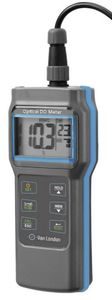
- Metrology - Laboratory
- Analytical Instrumentation
- Chlorine electrochemical sensor
- AlpHa Measurement Solutions, LLC

- Products
- Catalogs
- News & Trends
- Exhibitions
Chlorine electrochemical sensor for waterdigitalRS-485
Add to favorites
Compare this product
Characteristics
- Measured value
- chlorine
- Applications
- for water
- Output
- digital, Modbus RTU, RS-485
Description
The use of chlorine or chlorine compounds is one of the most common ways for drinking water facilities to ensure safe drinking water throughout the distribution system. Chlorine causes the oxidation (lysing action) of bacteria, microorganisms and viruses that if left untreated can cause a wide range of illnesses. The use of free chlorine (commonly as hypochlorite ion and hypochlorous acid) as a gas, liquid, or solid is the most common form of disinfection. When chlorine combines with nitrogen compounds it is often referred to as “combined chlorine” and may also be used as a disinfectant as it is safer to transport and handle though less effective as a disinfectant compared with free chlorine. The sum of free chlorine and combined chlorine in a water sample is referred to as total chlorine. AlpHa’s RC68 and RC67 Chlorine sensors provide a continuous, direct measurement of free and total chlorine in parts per million (ppm).
AlpHa’s amperometric RC68 Free Chlorine and RC67 Total Chlorine sensors perform continuous monitoring without requiring additional chemical reagents. Featuring integrated temperature compensation and superior long-term stability, the RC67 and RC68 models are available in both analog (4 – 20 mA or 0 – 5 V) or digital (RS-485 MODBUS RTU) output formats with measurement range options of 0 – 2 ppm, 0 – 5 ppm, 0 – 10 ppm, 0 – 20 ppm or 0 – 100 ppm.
Ranges:
0 – 2 ppm / 0 – 5 ppm / 0 – 10 ppm / 0 – 20 ppm / 0 – 100 ppm
Adjustable within 0 – 100 ppm
Typical Calibration Frequency: Monthly
Response Time: T90 120 Seconds
Other AlpHa Measurement Solutions, LLC products
Measurement Solutions
Related Searches
- Electrochemical electrode
- Gas probe
- Dissolved oxygen sensor (DO)
- Metal electrochemical electrode
- Electrochemical sensor
- Monitoring probe
- ORP electrochemical electrode
- Water electrochemical electrode
- Water electrochemical sensor
- Multiple probe
- Process dissolved oxygen sensor (DO)
- Conductivity probe
- Measuring electrochemical electrode
- Optical dissolved oxygen sensor (DO)
- Chlorine electrochemical sensor
- PH probe
- Dissolved oxygen probe
- Digital electrochemical sensor
- Ph/ORP detector
- Turbidity probe
*Prices are pre-tax. They exclude delivery charges and customs duties and do not include additional charges for installation or activation options. Prices are indicative only and may vary by country, with changes to the cost of raw materials and exchange rates.





